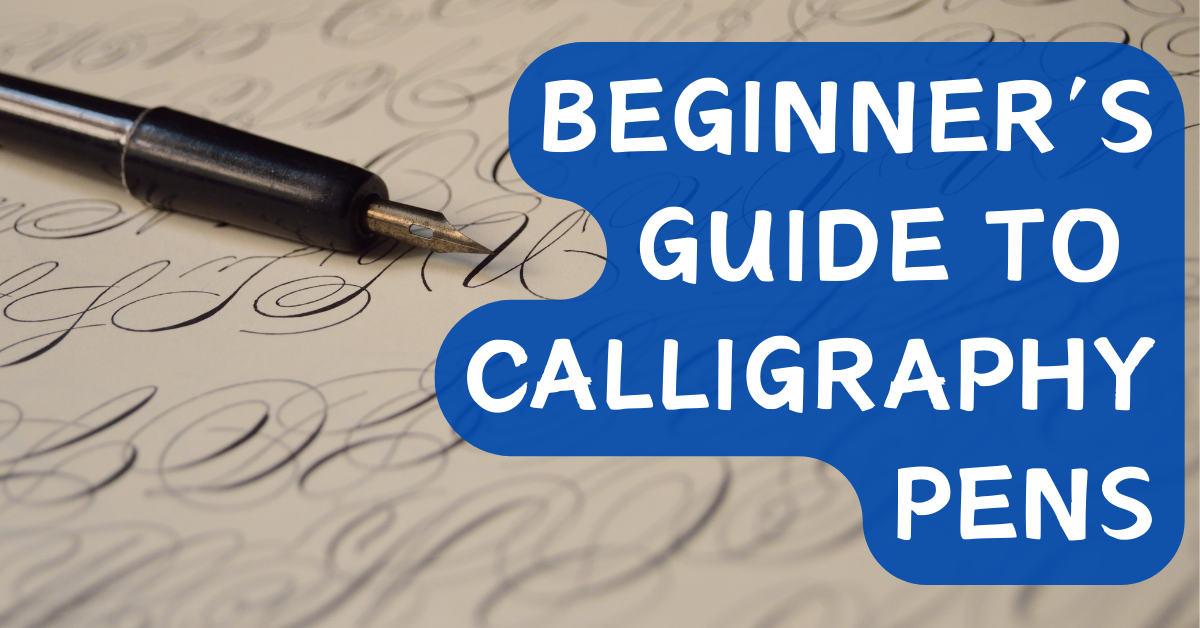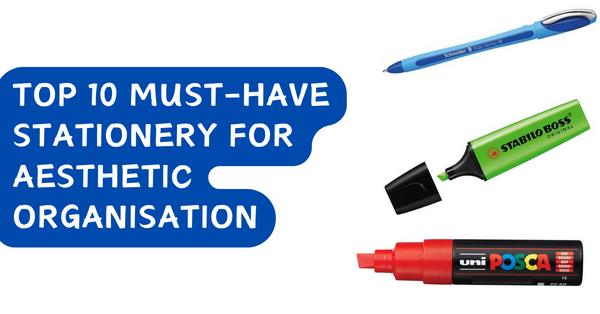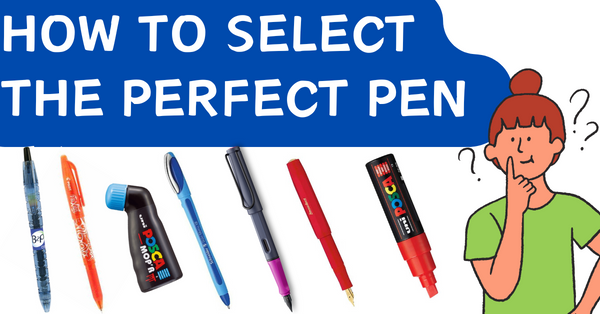Beginner's Guide to Calligraphy Pens

Calligraphy is more than just beautiful writing; it's an art form that combines skill, precision, and creativity.
For beginners, mastering calligraphy can be both rewarding and therapeutic.
In this guide, we'll take you through the essentials of using calligraphy pens and highlight some fantastic products available to help you get started.
Understanding Calligraphy
Calligraphy, derived from the Greek words "kallos" (beauty) and "graphein" (to write), is the art of beautiful writing.
It emphasises the formation of letters in an expressive, harmonious, and skillful manner.
Unlike regular handwriting, calligraphy focuses on uniformity, aesthetics, and the deliberate design of each character.
Types of Calligraphy
- Western Calligraphy: This style includes scripts such as Italic, Gothic, and Roman. It typically uses broad-tipped pens.
- Eastern Calligraphy: This encompasses Chinese, Japanese, and Korean styles, often utilizing brushes or brush pens.
- Modern Calligraphy: A more flexible style that combines elements from both traditional Western and Eastern calligraphy, often using pointed pens or brush pens.
Getting Started with Calligraphy Pens
Choosing the Right Pen
For beginners, selecting the right calligraphy pen is crucial.
Here are some options that cater to different needs and styles:
-
Manuscript Beginner's Calligraphy Set: This calligraphy set for beginners includes a variety of nib sizes, making it perfect for experimenting with different stroke widths and styles. The ergonomic design ensures comfort during prolonged practice sessions.
-
Pilot Parallel Pen: Known for its unique design, the Parallel Pen allows for smooth ink flow and precise control. It's ideal for creating bold and consistent lines, perfect for Gothic and Italic scripts.
-
Lamy Joy Calligraphy Pen: With its sleek design and interchangeable nibs, the Lamy Joy is great for both beginners and experienced calligraphers. It offers a comfortable grip and smooth ink delivery.
Essential Tools and Materials
In addition to a good calligraphy pen, you'll need a few other tools and materials:
-
Paper: Use smooth, high-quality paper to prevent ink bleeding and feathering. Practice pads specifically designed for calligraphy are a great choice.
-
Ink: While many calligraphy pens come with cartridges, consider using bottled ink for a wider variety of colours and better control over ink flow.
-
Ruler and Pencil: These are essential for drawing guidelines to ensure uniform letter height and spacing.
Basic Calligraphy Techniques
-
Holding the Pen: Hold your calligraphy pen at a 45-degree angle to the paper. This helps create the thick and thin lines characteristic of calligraphy.
-
Strokes and Pressure: Practice applying varying pressure to the pen to achieve different line thicknesses. Downstrokes should be thicker, while upstrokes should be thinner.
-
Basic Shapes: Begin with basic shapes like lines, circles, and ovals. These shapes form the foundation of most letters.
-
Consistency: Focus on maintaining consistent angles, spacing, and stroke widths. This uniformity is key to creating visually appealing calligraphy.
Practice Makes Perfect
As with any skill, practice is essential in calligraphy.
Here are some tips to help you practice effectively:
-
Start with Simple Alphabets: Begin with basic alphabets such as Italic or Gothic. These styles have clear, structured forms that are easier for beginners to learn.
-
Use Practice Sheets: Printable practice sheets with guidelines can help you maintain consistent letter size and spacing.
-
Break Down Letters: Analyse each letter and break it down into individual strokes. Practice each stroke separately before combining them to form letters.
-
Consistency and Patience: Don't rush the process. Take your time to practice each letter and maintain consistency in your strokes.
Exploring Advanced Techniques
Once you're comfortable with basic calligraphy, you can start exploring more advanced techniques and styles:
-
Flourishing: Add decorative elements to your letters, such as swirls and loops. Flourishing adds a touch of elegance to your calligraphy.
-
Blending Colours: Experiment with different ink colours to create gradient effects. This technique can add depth and dimension to your work.
-
Different Nib Sizes: Use different nib sizes to create varied line widths. This can help you achieve a more dynamic and interesting composition.
-
Combining Styles: Mix and match different calligraphy styles to create unique and personalized pieces.
Caring for Your Calligraphy Pens
To ensure your calligraphy pens last long and continue to perform well, proper care is essential:
-
Clean Regularly: Clean your pens after each use to prevent ink from drying and clogging the nib. Use warm water and a soft brush to gently clean the nib.
-
Store Properly: Store your pens horizontally to prevent ink from pooling at the nib. If possible, keep them in a pen case to protect them from dust and damage.
-
Replace Nibs and Cartridges: Regularly check the condition of your nibs and ink cartridges. Use replacements such as Pilot ink cartridges to replace them as needed to maintain smooth ink flow and consistent line quality.

Conclusion
Embarking on the journey of calligraphy pens can be both fulfilling and meditative.
With the right tools, techniques, and a bit of patience, you'll be well on your way to mastering this beautiful art form.
Remember to experiment with different styles and have fun with your practice. The products available at Dr. Pen offer a great starting point, providing the quality and variety needed to explore and perfect your calligraphy skills.
Happy writing!
If you're unsure if calligraphy pens are right for you, take a look at how to select the perfect pen based on writing style and grip preference.
Also in Guides

Top 10 Must-Have Stationery Items for Aesthetic Organisation
Discover the top 10 must-have stationery items to elevate your organization game. From premium pens to stylish notebooks and highlighters, this guide features the best tools for an aesthetically pleasing and productive workspace.

LAMY Safari Note+ vs Apple Pencil
Two prominent contenders stand out for digital writing instruments for iPad users: the LAMY Safari Note+ and the Apple Pencil. This comparison delves into the advantages and disadvantages of the Apple Pencil and LAMY Safari Note+.



